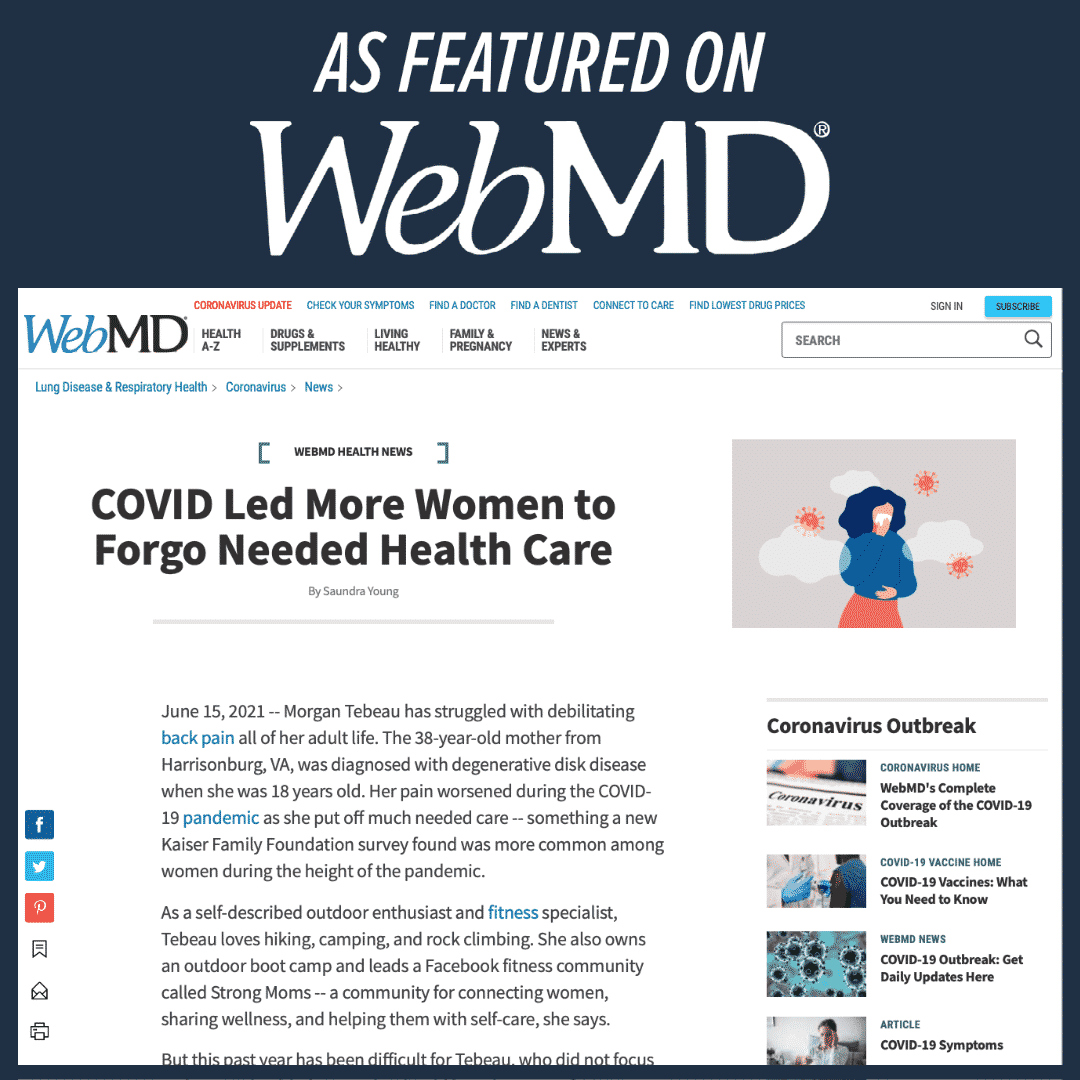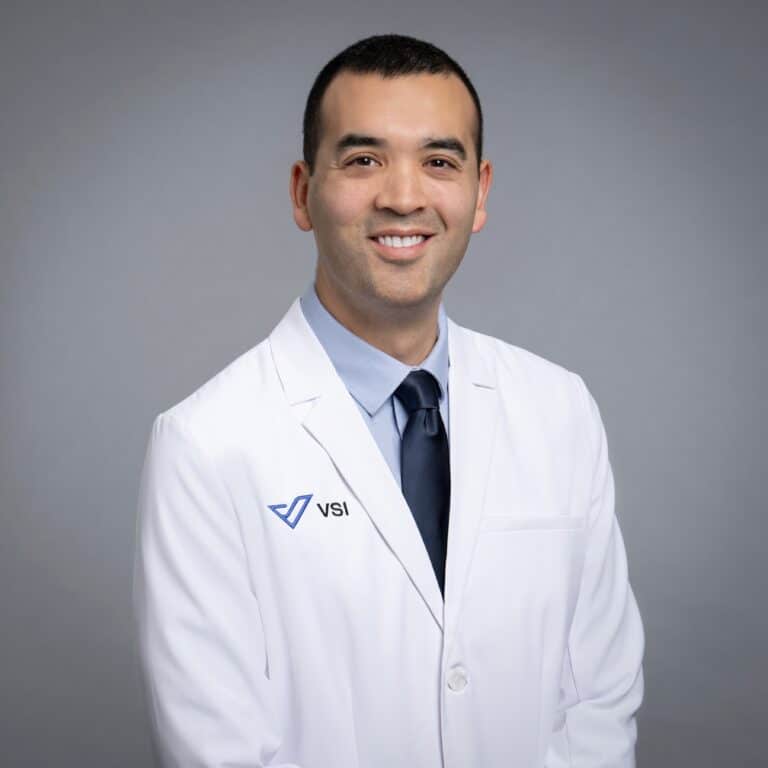
As Seen on WebMD: COVID Led More Women to Forgo Needed Health Care
June 15, 2021 – Morgan Tebeau has struggled with debilitating back pain all of her adult life. The 38-year-old mother from Harrisonburg, VA, was diagnosed with degenerative disk disease when she was 18 years old. Her pain worsened during the COVID-19 pandemic as she put off much needed care — something a new Kaiser Family Foundation survey found was more common among women during the height of the pandemic.
As a self-described outdoor enthusiast and fitness specialist, Tebeau loves hiking, camping, and rock climbing. She also owns an outdoor boot camp and leads a Facebook fitness community called Strong Moms — a community for connecting women, sharing wellness, and helping them with self-care, she says.
But this past year has been difficult for Tebeau, who did not focus on her own health the way she should have because of COVID-19.
“I was in the throes of transitioning my in-person fitness business to an online model, and I had my daughter at home with me full-time. I felt like I couldn’t pull back from these responsibilities to explore what was going on with my body, and the pandemic made it even easier to avoid the critical self-care that I needed,” she says
“Deep in COVID lockdown, I didn’t feel that I could really address the pain in the way I normally would have or take care of it as quickly as I wanted to.”
By the time Tebeau got to the doctor, her health had gotten much worse.
“My pain was definitely at a 10. Everyday tasks like laundry, carrying pretty much anything, including picking up my daughter, were out of the question. I was struggling to drive myself, because the pain was distracting, and I was coaching my fitness clients in a neck brace. All of this was leaving me completely drained physically, mentally, and emotionally at the end of the day.”
Her pain began last September, but she didn’t see a doctor and have the proper tests until November. By then, Tebeau learned she had two herniated disks, one of which required surgery.
The Kaiser survey found women more likely to go without health care, compared to men, possibly resulting in a higher number of women with severe health issues after the pandemic is over.
More women have skipped preventive services such as annual checkups and routine tests, at 38% and 26%, respectively, as well as recommended tests or treatment, at 23% and 15%, respectively. This delay in care could result in more severe health issues down the road.
According to the survey, more women have not filled a prescription, have cut pills in half, or have skipped doses of their medications. And more women report they could not get a doctor’s appointment because of the pandemic.
Colin Haines, MD, is a spinal surgeon at VSI who treats Tebeau. He says it does not surprise him that a high rate of missed care is linked to the COVID pandemic. He witnessed this for himself at his own practice and at the VSI Most patients who skipped out on care this past year were women, he says.
“What we saw at the height of the pandemic was people were scared to come in, and for good reason. They were scared to see their doctor and they were scared to leave the house because of the risk of the pandemic.”
Those fears likely caused non-COVID illnesses, and people ended up having worse symptoms, Haines says.
“By the time that many patients finally saw me, the delay caused their pain to spiral out of control, requiring us to jump in and get them fixed, sometimes surgically, on a quicker timeline than we normally would have had to if they received early treatment.”
For Tebeau, this is exactly what happened.
“Morgan was really getting to that point where if we didn’t get her surgically fixed, that things would have continued to worsen and that the weakness and pain in her arm might become permanent. A lot of that, I believe, was caused by the fact that Morgan waited. She was thinking about everyone else before herself until she had an ‘aha’ moment with her daughter where she said, ‘Enough; if I’m not caring for myself, I’m not going to be able to care for you or anyone else and not be able to live the active life I want to.’”
His advice?
“Seek help sooner rather than later. It doesn’t mean you have to rush off to the doctor for every bruise you have, but if something doesn’t feel normal, to me that’s a major trigger.”
Deep in COVID lockdown, I didn’t feel that I could really address the pain in the way I normally would have or take care of it as quickly as I wanted to.
A Johns Hopkins survey published in JAMA Network Open found that 41% of U.S. adults skipped care between March and mid-July 2020. Many attributed it to the pandemic.
“We found that 60% of individuals who needed an elective surgery reported missing that elective surgery,” said Kelly Anderson, PhD, from the Johns Hopkins Bloomberg School of Public Health, who is one of the study authors. They found 58% of people who needed preventive care — for example, cancer screenings — didn’t get it, and 46% of people getting mental health services skipped appointments. And 15% of people reported skipping one or more doses of prescription medication.
“Many individuals also did not seek medical care for new, potentially severe health issues. In our survey, 51% of individuals who reported having a new health issue that they scored as severe did not receive care for this issue,” Anderson says.
She believes it’s important for providers and health insurers to work to reconnect people to the medical system.
“For example, for a woman who typically needs a breast cancer screening who missed that during the COVID-19 pandemic, proactively reaching out to her to reschedule the screening,” she suggests
The outgoing president of the American Medical Association, Susan Bailey, MD, says doctors have been concerned from the beginning of the pandemic that patients were not coming to appointments for fear of COVID-19.
“I think every physician has experienced this slowdown, and we are trying to get the message out very early on that it’s safe to go to the doctor, that doctors are taking all the precautions they can to make sure that COVID is not transmitted in a doctor/hospital encounter,” she says. “Many people are just still anxious to go out.”
Continuing down this road of delaying care is perilous, says Bailey.
“It can be very risky to your health to put off needed medical procedures and routine screenings to prevent or at least detect disease early. … Not seeking care for conditions such as diabetes, asthma, and children’s immunizations puts us at risk of medical problems that didn’t have to happen.”
And skipping out on important health care could be deadly.
“I want patients to understand that there’s really no time like the present to get caught up on their health care needs. Over 90% of physicians and more than 80% of nurses have been immunized against COVID-19. Health care facilities are very safe, they know how to protect you. If you’ve gotten immunized yourself, and we hope you have, you know the risk of catching COVID-19 when going to the doctor or getting a routine screening is vanishingly small. There’s no time like the present to get the medical care you need,” Bailey says.
Tebeau can attest to this.
“As a mother, sometimes the automatic response is to push through pain and discomfort in order to be the caretaker for others. We put on our Superwoman cape and say, ‘I can handle this.’”
But withholding self-care is never the answer and, in her case, it was almost tragic, she says.
“We need to start associating putting ourselves on the back burner with being a very dangerous and destructive behavior,” she cautions. “Self-care is more than bubble baths and brunch; it’s putting your health at the top of your priority list. You can’t be anything good to anyone in your life if you are broken, in pain, or struggling emotionally.”
Topics covered
About the Author
Featured Resources
Insights to Achieve a Pain-Free Life



